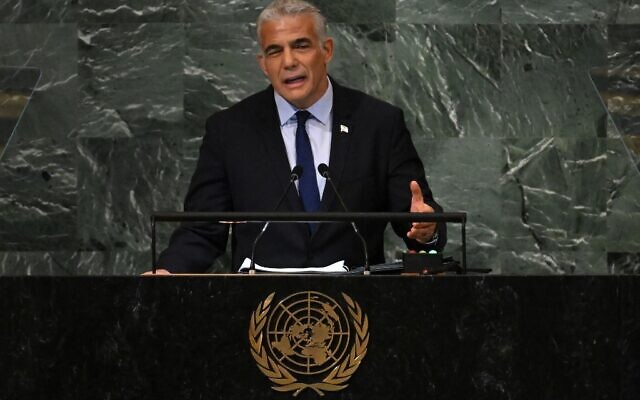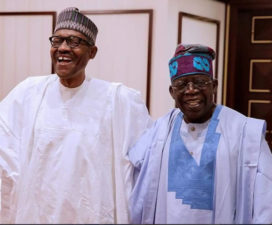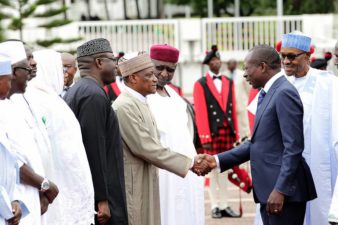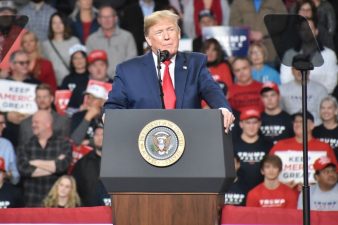Prime Minister Yair Lapid said a two-state solution to the Israeli-Palestinian conflict was “the right thing” for Israel, addressing the world from the United Nations General Assembly’s high-level meeting Thursday.
Speaking on his largest stage since becoming prime minister three months ago, Lapid decried Iranian antisemitism, urged the world to counter Tehran’s nuclear ambitions with a “credible military threat,” touted Israel’s peace agreements with regional neighbors and said he and most Israelis supported a peaceful Palestinian state alongside Israel.
“An agreement with the Palestinians, based on two states for two peoples, is the right thing for Israel’s security, for Israel’s economy and for the future of our children,” he declared.
Lapid’s decision to give full-throated backing to Palestinian statehood on the world stage marked a sharp shift from addresses in the previous five years from former prime minister Benjamin Netanyahu, who largely used the pulpit to inveigh against Iran and what he claimed was Palestinian rejection of Israeli peace efforts. In 2016, Netanyahu told the UN plenum he was committed to a two-state vision, but later disavowed the comments.
Lapid said Israel had only a single condition to Palestinian statehood: “That a future Palestinian state will be a peaceful one. That it will not become another terror base from which to threaten the well-being and the very existence of Israel. That we will have the ability to protect the security of all the citizens of Israel, at all times.”
“You can ask us to live according to the values in the UN Charter,” he said, “but you cannot ask us to die for them.”
The news that Lapid would call for a two-state solution in his speech had drawn condemnation from the right flank of his governing coalition, as well as Netanyahu, who is currently opposition leader and his chief rival in upcoming elections.
In a statement released while Lapid was still delivering his address, Netanyahu accused the premier of “bringing the Palestinians back to the forefront of the world stage and putting Israel right into the Palestinian pit.”
However, the comments drew widespread praise from Lapid’s centrist and left-wing allies, as well as US Ambassador to Israel Tom Nides, who called the speech “courageous.”
“Peaceful coexistence is only way forward. As POTUS urged here in July, ‘two peoples, with deep & ancient roots in this land, living side by side in peace and security,’” Nides tweeted.
As expected, Lapid spent much of his address focusing on threats from Iran, which Israel accuses of pursuing nuclear weapons. Efforts to restore the 2015 Joint Comprehensive Plan of Action, which curbed Iran’s enrichment activities in exchange for sanctions relief before the US withdrew in 2018, recently fell apart, with Israel calling the pact a “bad deal.”
“If the Iranian regime gets a nuclear weapon, they will use it,” Lapid said, calling for the world to put forth a “credible military threat.”
“And then — and only then — to negotiate a longer and stronger deal with them,” he said.
“It needs to be made clear to Iran that if it advances its nuclear program, the world will not respond with words, but with military force,” said the premier. “Every time a threat like that was put on the table in the past, Iran stopped and retreated.”
Lapid has vowed that Israel will defend itself in any way possible from Iranian threats; though the United States has flexed its muscles, US President Joe Biden’s administration has maintained that it prefers to pursue a diplomatic solution.
Lapid accused the world of “choosing the easy option.” He said that Israel cannot do that, and will “do whatever it takes” to stop Tehran from getting a nuclear weapon.
“We will not stand by while there are those who try to kill us. Not again. Never Again.”
Noting widespread protests in Iran over the death of 22-year-old Iranian woman Mahsa Amini after she was arrested for violating hijab regulations, Lapid charged Tehran with hating its own people, saying that “the world is silent” while young Iranians suffer.
“They pay for their desire to live a life of freedom — with their lives,” he said.
“Their hate is a way of life,” he said, mentioning novelist Salman Rushdie, who was stabbed in August after living for decades under an Iranian fatwa calling for his death. “It is a way to preserve their oppressive rule.”
He also accused the world of silence in the face of Iranian calls for Israel’s destruction.
“And this building is silent,” he charged. “What are you afraid of? Has there ever been a time in human history where silence stopped violence?”
Building the Promised Land
Lapid opened his address to the General Assembly with a reminder that the very same body voted to create the Jewish state in November 1947.
Seventy-five years later, said the prime minister, Israel is a prosperous, innovative liberal democracy. This happened, Lapid argued, because Israel decided not to be a victim.
“We didn’t only reach the Promised Land, we are building the Promised Land,” he said.
History is determined by people, he continued, and they can choose whether the future is one of war and isolation or peace and partnership.
Lapid then pivoted to May’s Negev Summit: “There were six of us. The secretary of state of the United States, foreign ministers of Egypt, the United Arab Emirates, Bahrain, Morocco and Israel. A dinner that only two years ago no one would have believed was possible.”
He recounted how the dinner was suddenly interrupted by news of a deadly terror attack in Hadera. “The room fell silent. And then one of the Arab foreign ministers said, ‘We are always against terror, that’s why we are here,’” he recalled.
Lapid — who is seeking reelection after his unwieldy coalition of left, center, right and Arab parties fell apart in May — noted that his caretaker government has Arab ministers and an Arab party, the Supreme Court has Arab judges, and Arab doctors save lives in Israeli hospitals.
“Come and visit us. You will discover that Israel is an incredible cultural mosaic,” he said.
Lapid also used his speech to decry the “demise of truth,” claiming that anti-Israel rhetoric and propaganda was rife with false or misleading information.
“Our democracies are slowly being poisoned by lies and fake news,” he said. “Reckless politicians, totalitarian states and radical organizations are undermining our perception of reality.”
He cited a May 2021 case of a picture of a Russian girl being used as a photo of a fictitious Palestinian child killed by Israeli jets. Lapid charged that billions of dollars have been invested into spreading lies about Israel.
“I am not a guest in this building,” Lapid stressed, months after a member of a UN Human Rights Council panel investigating Israeli actions against Palestinians told a podcast that he questioned whether Israel should be a UN member.
“Israel is a proud sovereign nation, and an equal member of the United Nations,” Lapid said. “We will not be silent when those who wish to harm us, use this very stage to spread lies about us.”
Iran is “conducting this orchestra of hate,” he charged.




